BBA309 - Business Ethics: Ethical Choices at Woolworths, Semester 1
VerifiedAdded on 2023/03/23
|13
|3057
|35
Report
AI Summary
This report examines the ethical issues that companies face today, utilizing Kantian and utilitarianism theories to analyze these challenges, with a focus on Woolworths Group Co. Ltd. The study identifies the existence of ethical issues, particularly those arising from technology, and highlights financial gain as a primary motivator for ethical impropriety. While the Kantian and utilitarianism theories appear divergent, commonalities exist, with the Kantian theory being deemed more applicable to business ethics. The report delves into specific areas such as financial practices (underpayment of employees), social media usage (misleading advertising and privacy concerns), and their ethical implications, providing a comprehensive overview of the ethical landscape within a corporate setting.
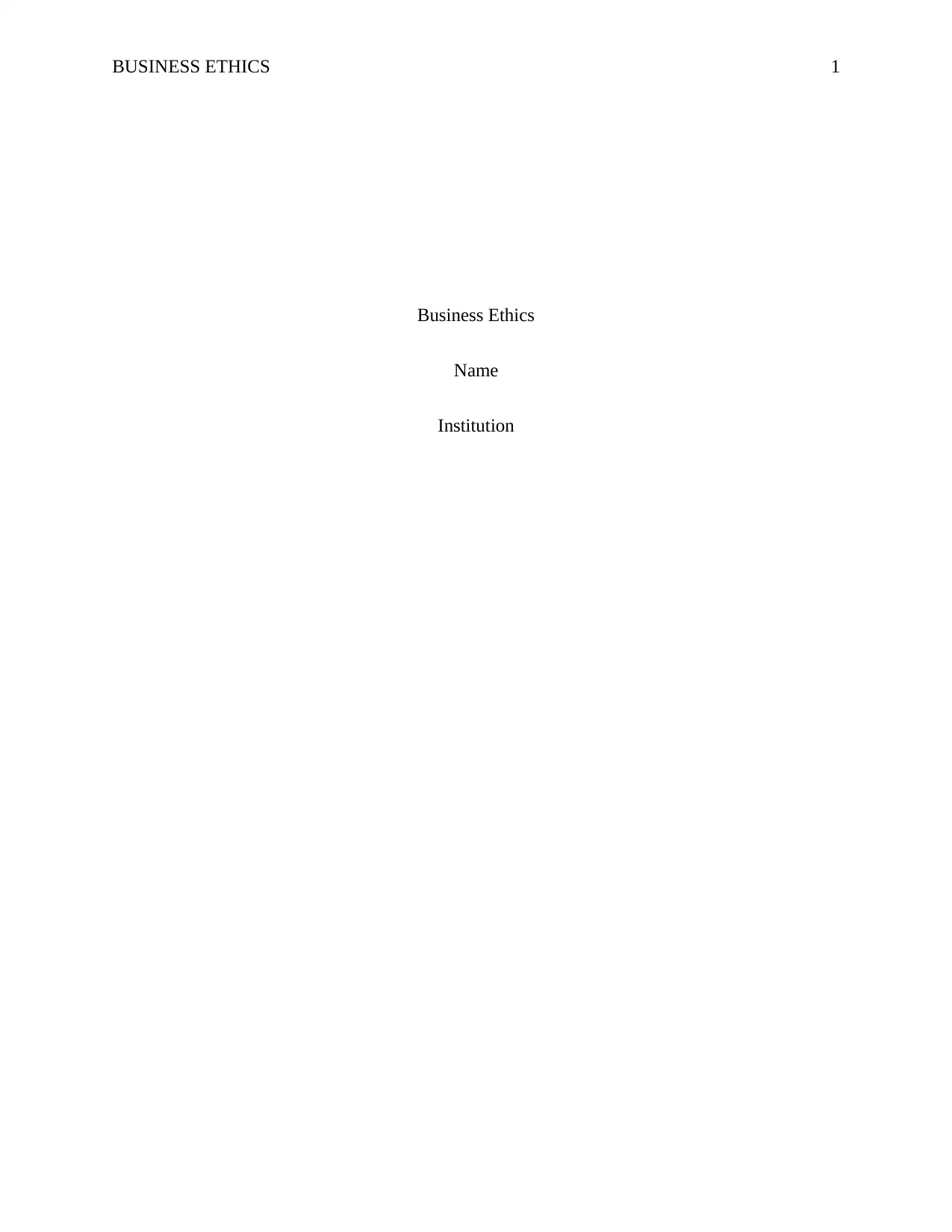
BUSINESS ETHICS 1
Business Ethics
Name
Institution
Business Ethics
Name
Institution
Paraphrase This Document
Need a fresh take? Get an instant paraphrase of this document with our AI Paraphraser
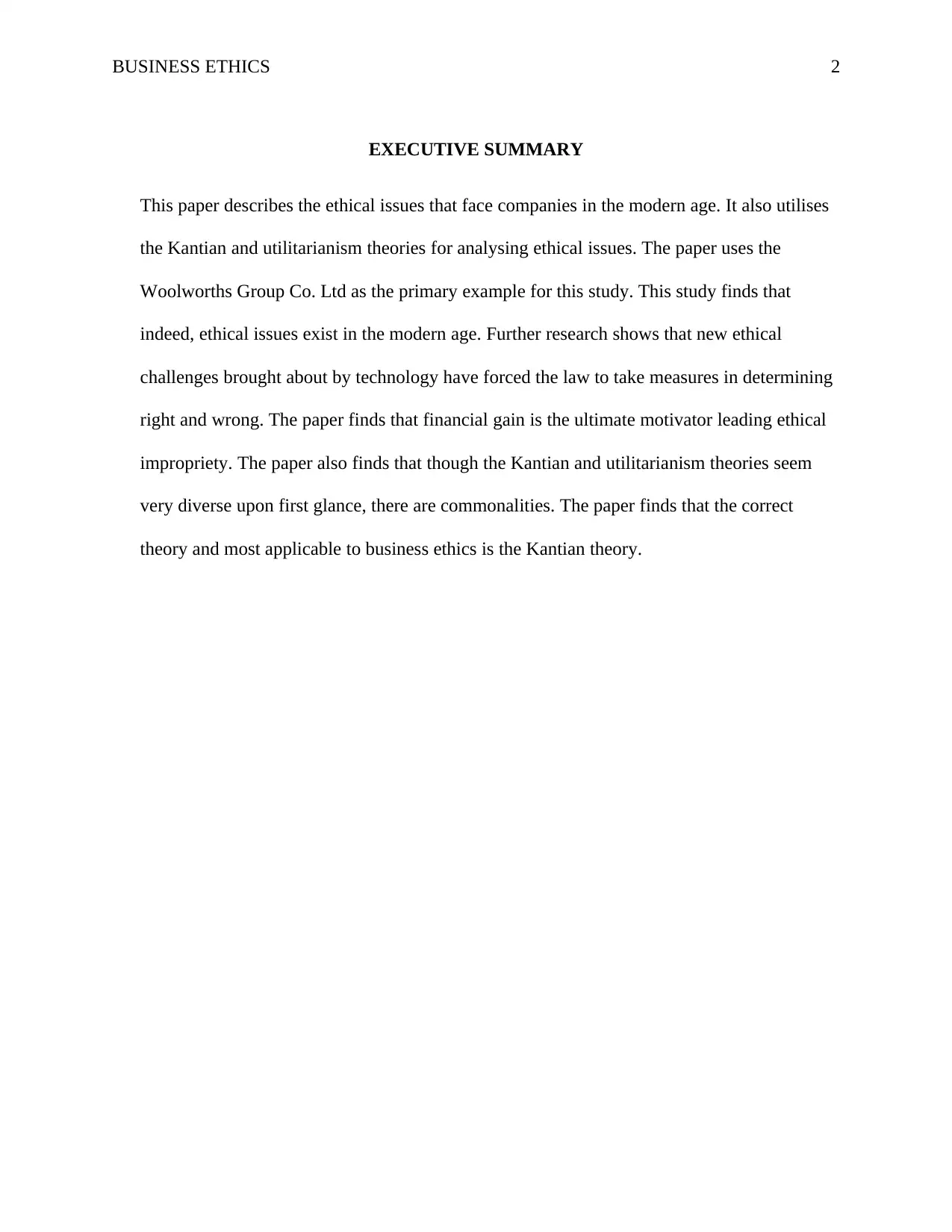
BUSINESS ETHICS 2
EXECUTIVE SUMMARY
This paper describes the ethical issues that face companies in the modern age. It also utilises
the Kantian and utilitarianism theories for analysing ethical issues. The paper uses the
Woolworths Group Co. Ltd as the primary example for this study. This study finds that
indeed, ethical issues exist in the modern age. Further research shows that new ethical
challenges brought about by technology have forced the law to take measures in determining
right and wrong. The paper finds that financial gain is the ultimate motivator leading ethical
impropriety. The paper also finds that though the Kantian and utilitarianism theories seem
very diverse upon first glance, there are commonalities. The paper finds that the correct
theory and most applicable to business ethics is the Kantian theory.
EXECUTIVE SUMMARY
This paper describes the ethical issues that face companies in the modern age. It also utilises
the Kantian and utilitarianism theories for analysing ethical issues. The paper uses the
Woolworths Group Co. Ltd as the primary example for this study. This study finds that
indeed, ethical issues exist in the modern age. Further research shows that new ethical
challenges brought about by technology have forced the law to take measures in determining
right and wrong. The paper finds that financial gain is the ultimate motivator leading ethical
impropriety. The paper also finds that though the Kantian and utilitarianism theories seem
very diverse upon first glance, there are commonalities. The paper finds that the correct
theory and most applicable to business ethics is the Kantian theory.
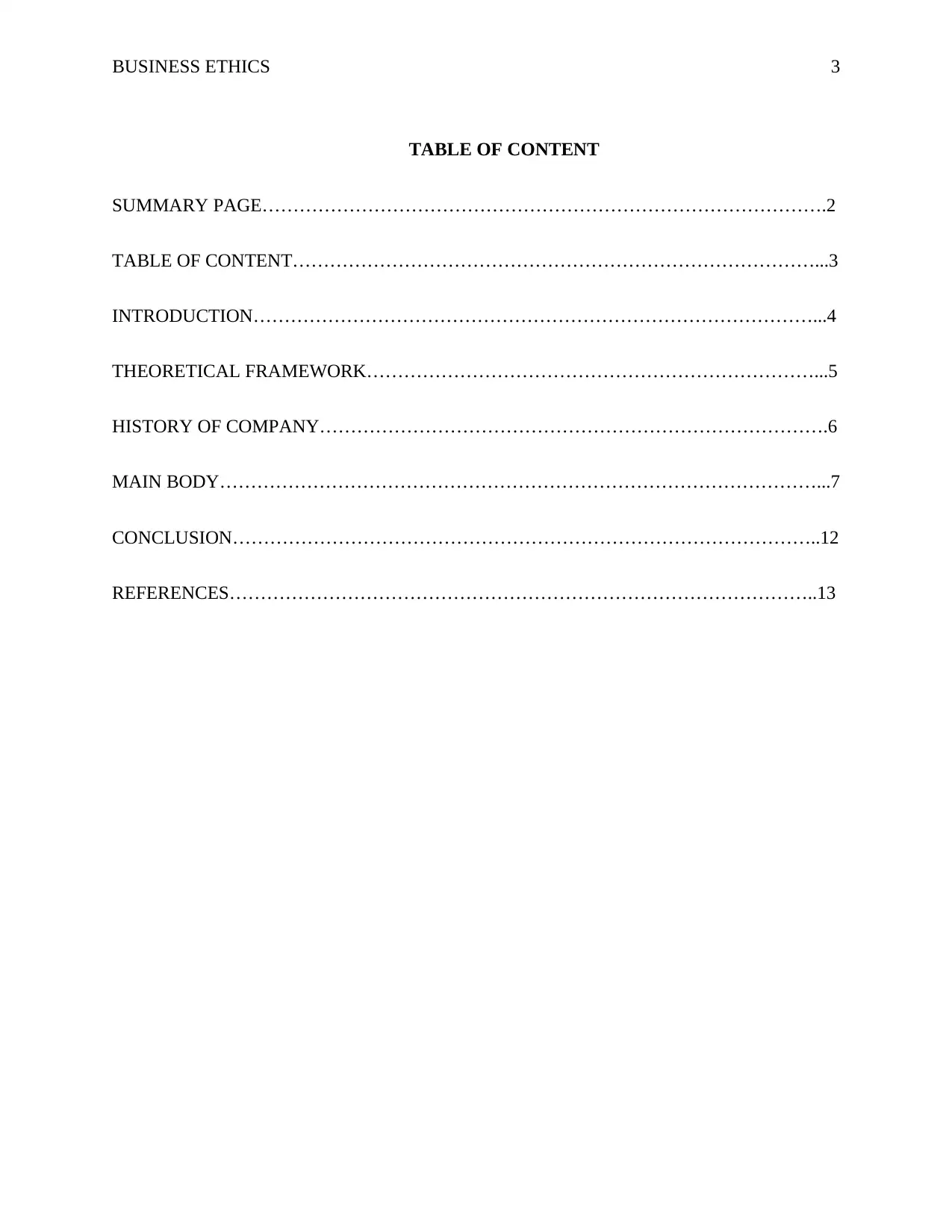
BUSINESS ETHICS 3
TABLE OF CONTENT
SUMMARY PAGE……………………………………………………………………………….2
TABLE OF CONTENT…………………………………………………………………………...3
INTRODUCTION………………………………………………………………………………...4
THEORETICAL FRAMEWORK………………………………………………………………...5
HISTORY OF COMPANY……………………………………………………………………….6
MAIN BODY……………………………………………………………………………………...7
CONCLUSION…………………………………………………………………………………..12
REFERENCES…………………………………………………………………………………..13
TABLE OF CONTENT
SUMMARY PAGE……………………………………………………………………………….2
TABLE OF CONTENT…………………………………………………………………………...3
INTRODUCTION………………………………………………………………………………...4
THEORETICAL FRAMEWORK………………………………………………………………...5
HISTORY OF COMPANY……………………………………………………………………….6
MAIN BODY……………………………………………………………………………………...7
CONCLUSION…………………………………………………………………………………..12
REFERENCES…………………………………………………………………………………..13
⊘ This is a preview!⊘
Do you want full access?
Subscribe today to unlock all pages.

Trusted by 1+ million students worldwide
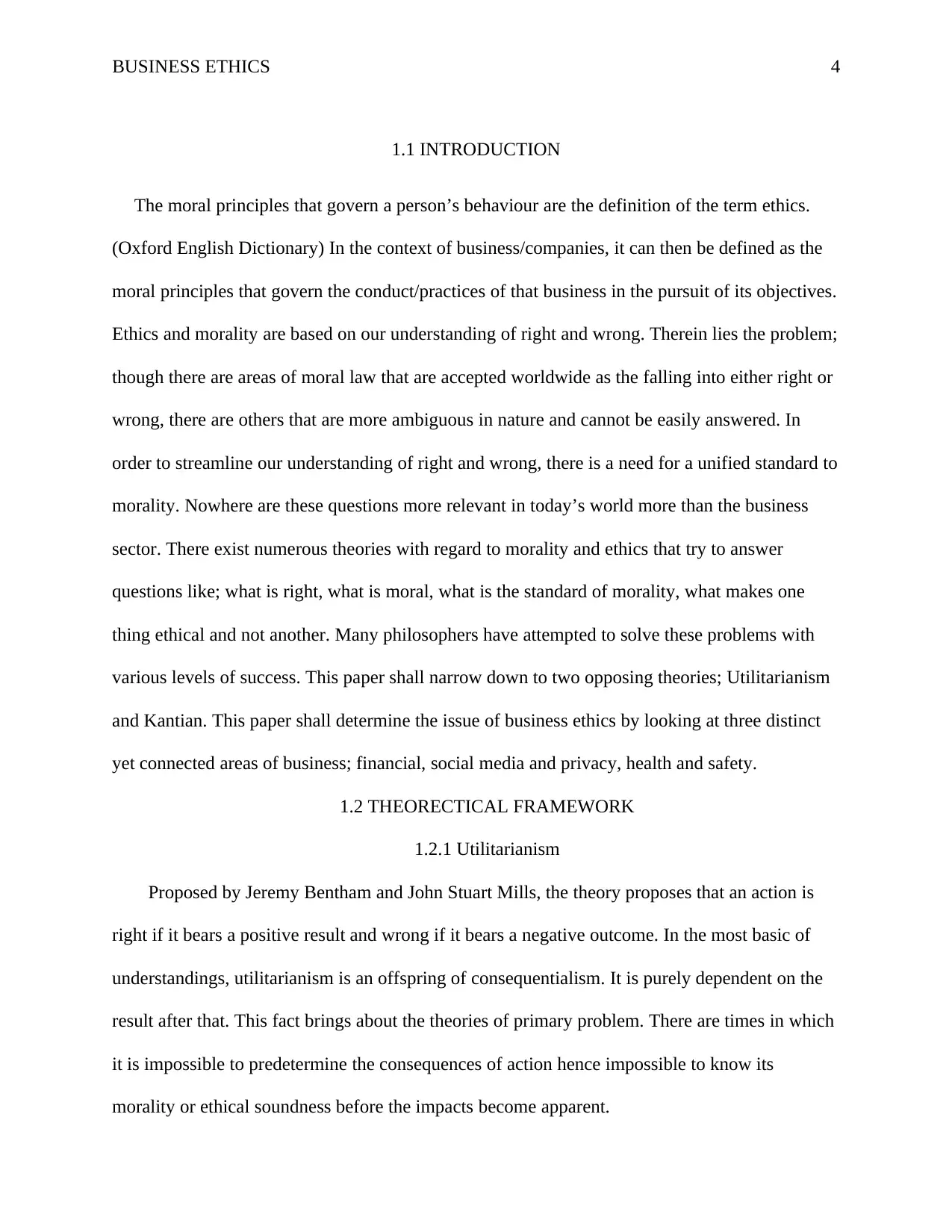
BUSINESS ETHICS 4
1.1 INTRODUCTION
The moral principles that govern a person’s behaviour are the definition of the term ethics.
(Oxford English Dictionary) In the context of business/companies, it can then be defined as the
moral principles that govern the conduct/practices of that business in the pursuit of its objectives.
Ethics and morality are based on our understanding of right and wrong. Therein lies the problem;
though there are areas of moral law that are accepted worldwide as the falling into either right or
wrong, there are others that are more ambiguous in nature and cannot be easily answered. In
order to streamline our understanding of right and wrong, there is a need for a unified standard to
morality. Nowhere are these questions more relevant in today’s world more than the business
sector. There exist numerous theories with regard to morality and ethics that try to answer
questions like; what is right, what is moral, what is the standard of morality, what makes one
thing ethical and not another. Many philosophers have attempted to solve these problems with
various levels of success. This paper shall narrow down to two opposing theories; Utilitarianism
and Kantian. This paper shall determine the issue of business ethics by looking at three distinct
yet connected areas of business; financial, social media and privacy, health and safety.
1.2 THEORECTICAL FRAMEWORK
1.2.1 Utilitarianism
Proposed by Jeremy Bentham and John Stuart Mills, the theory proposes that an action is
right if it bears a positive result and wrong if it bears a negative outcome. In the most basic of
understandings, utilitarianism is an offspring of consequentialism. It is purely dependent on the
result after that. This fact brings about the theories of primary problem. There are times in which
it is impossible to predetermine the consequences of action hence impossible to know its
morality or ethical soundness before the impacts become apparent.
1.1 INTRODUCTION
The moral principles that govern a person’s behaviour are the definition of the term ethics.
(Oxford English Dictionary) In the context of business/companies, it can then be defined as the
moral principles that govern the conduct/practices of that business in the pursuit of its objectives.
Ethics and morality are based on our understanding of right and wrong. Therein lies the problem;
though there are areas of moral law that are accepted worldwide as the falling into either right or
wrong, there are others that are more ambiguous in nature and cannot be easily answered. In
order to streamline our understanding of right and wrong, there is a need for a unified standard to
morality. Nowhere are these questions more relevant in today’s world more than the business
sector. There exist numerous theories with regard to morality and ethics that try to answer
questions like; what is right, what is moral, what is the standard of morality, what makes one
thing ethical and not another. Many philosophers have attempted to solve these problems with
various levels of success. This paper shall narrow down to two opposing theories; Utilitarianism
and Kantian. This paper shall determine the issue of business ethics by looking at three distinct
yet connected areas of business; financial, social media and privacy, health and safety.
1.2 THEORECTICAL FRAMEWORK
1.2.1 Utilitarianism
Proposed by Jeremy Bentham and John Stuart Mills, the theory proposes that an action is
right if it bears a positive result and wrong if it bears a negative outcome. In the most basic of
understandings, utilitarianism is an offspring of consequentialism. It is purely dependent on the
result after that. This fact brings about the theories of primary problem. There are times in which
it is impossible to predetermine the consequences of action hence impossible to know its
morality or ethical soundness before the impacts become apparent.
Paraphrase This Document
Need a fresh take? Get an instant paraphrase of this document with our AI Paraphraser
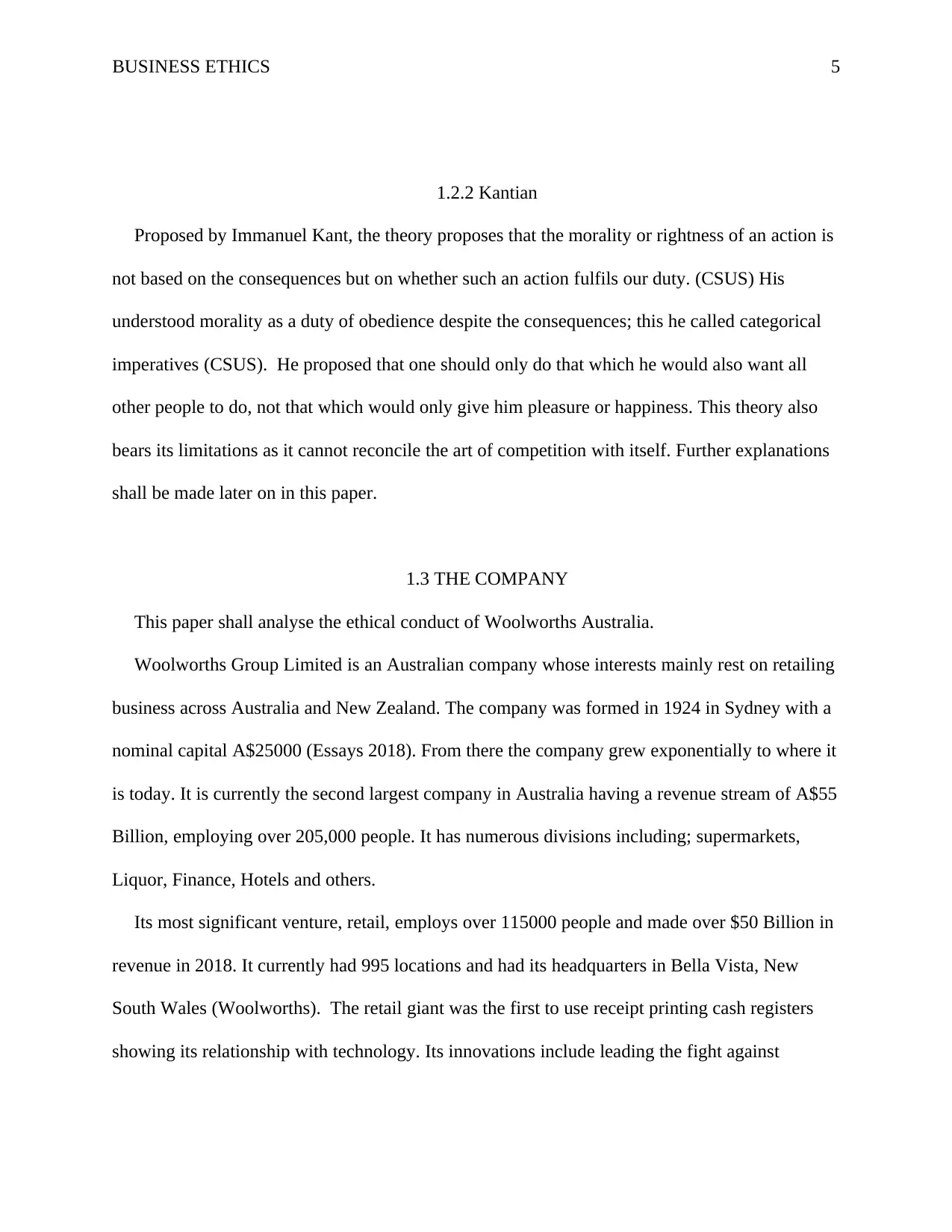
BUSINESS ETHICS 5
1.2.2 Kantian
Proposed by Immanuel Kant, the theory proposes that the morality or rightness of an action is
not based on the consequences but on whether such an action fulfils our duty. (CSUS) His
understood morality as a duty of obedience despite the consequences; this he called categorical
imperatives (CSUS). He proposed that one should only do that which he would also want all
other people to do, not that which would only give him pleasure or happiness. This theory also
bears its limitations as it cannot reconcile the art of competition with itself. Further explanations
shall be made later on in this paper.
1.3 THE COMPANY
This paper shall analyse the ethical conduct of Woolworths Australia.
Woolworths Group Limited is an Australian company whose interests mainly rest on retailing
business across Australia and New Zealand. The company was formed in 1924 in Sydney with a
nominal capital A$25000 (Essays 2018). From there the company grew exponentially to where it
is today. It is currently the second largest company in Australia having a revenue stream of A$55
Billion, employing over 205,000 people. It has numerous divisions including; supermarkets,
Liquor, Finance, Hotels and others.
Its most significant venture, retail, employs over 115000 people and made over $50 Billion in
revenue in 2018. It currently had 995 locations and had its headquarters in Bella Vista, New
South Wales (Woolworths). The retail giant was the first to use receipt printing cash registers
showing its relationship with technology. Its innovations include leading the fight against
1.2.2 Kantian
Proposed by Immanuel Kant, the theory proposes that the morality or rightness of an action is
not based on the consequences but on whether such an action fulfils our duty. (CSUS) His
understood morality as a duty of obedience despite the consequences; this he called categorical
imperatives (CSUS). He proposed that one should only do that which he would also want all
other people to do, not that which would only give him pleasure or happiness. This theory also
bears its limitations as it cannot reconcile the art of competition with itself. Further explanations
shall be made later on in this paper.
1.3 THE COMPANY
This paper shall analyse the ethical conduct of Woolworths Australia.
Woolworths Group Limited is an Australian company whose interests mainly rest on retailing
business across Australia and New Zealand. The company was formed in 1924 in Sydney with a
nominal capital A$25000 (Essays 2018). From there the company grew exponentially to where it
is today. It is currently the second largest company in Australia having a revenue stream of A$55
Billion, employing over 205,000 people. It has numerous divisions including; supermarkets,
Liquor, Finance, Hotels and others.
Its most significant venture, retail, employs over 115000 people and made over $50 Billion in
revenue in 2018. It currently had 995 locations and had its headquarters in Bella Vista, New
South Wales (Woolworths). The retail giant was the first to use receipt printing cash registers
showing its relationship with technology. Its innovations include leading the fight against
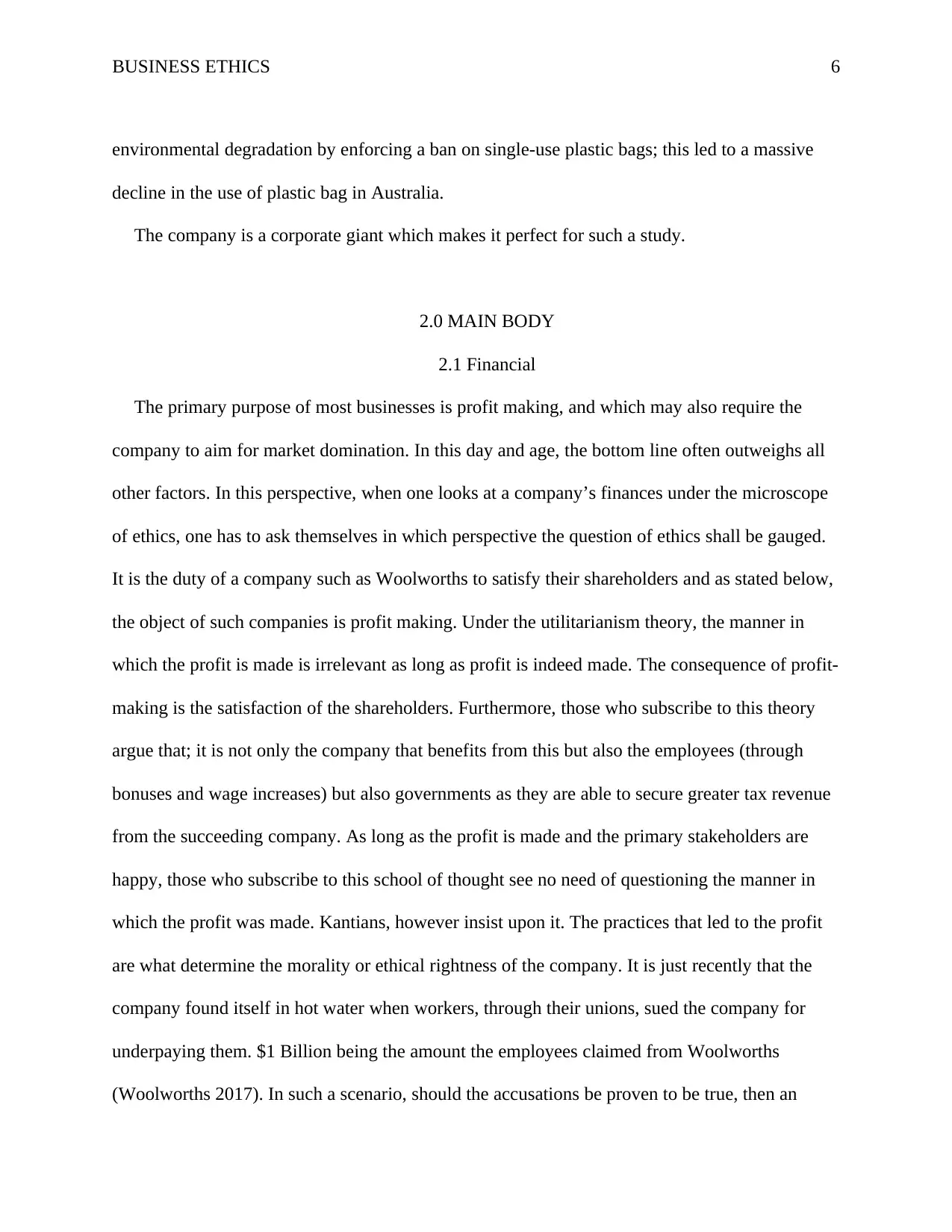
BUSINESS ETHICS 6
environmental degradation by enforcing a ban on single-use plastic bags; this led to a massive
decline in the use of plastic bag in Australia.
The company is a corporate giant which makes it perfect for such a study.
2.0 MAIN BODY
2.1 Financial
The primary purpose of most businesses is profit making, and which may also require the
company to aim for market domination. In this day and age, the bottom line often outweighs all
other factors. In this perspective, when one looks at a company’s finances under the microscope
of ethics, one has to ask themselves in which perspective the question of ethics shall be gauged.
It is the duty of a company such as Woolworths to satisfy their shareholders and as stated below,
the object of such companies is profit making. Under the utilitarianism theory, the manner in
which the profit is made is irrelevant as long as profit is indeed made. The consequence of profit-
making is the satisfaction of the shareholders. Furthermore, those who subscribe to this theory
argue that; it is not only the company that benefits from this but also the employees (through
bonuses and wage increases) but also governments as they are able to secure greater tax revenue
from the succeeding company. As long as the profit is made and the primary stakeholders are
happy, those who subscribe to this school of thought see no need of questioning the manner in
which the profit was made. Kantians, however insist upon it. The practices that led to the profit
are what determine the morality or ethical rightness of the company. It is just recently that the
company found itself in hot water when workers, through their unions, sued the company for
underpaying them. $1 Billion being the amount the employees claimed from Woolworths
(Woolworths 2017). In such a scenario, should the accusations be proven to be true, then an
environmental degradation by enforcing a ban on single-use plastic bags; this led to a massive
decline in the use of plastic bag in Australia.
The company is a corporate giant which makes it perfect for such a study.
2.0 MAIN BODY
2.1 Financial
The primary purpose of most businesses is profit making, and which may also require the
company to aim for market domination. In this day and age, the bottom line often outweighs all
other factors. In this perspective, when one looks at a company’s finances under the microscope
of ethics, one has to ask themselves in which perspective the question of ethics shall be gauged.
It is the duty of a company such as Woolworths to satisfy their shareholders and as stated below,
the object of such companies is profit making. Under the utilitarianism theory, the manner in
which the profit is made is irrelevant as long as profit is indeed made. The consequence of profit-
making is the satisfaction of the shareholders. Furthermore, those who subscribe to this theory
argue that; it is not only the company that benefits from this but also the employees (through
bonuses and wage increases) but also governments as they are able to secure greater tax revenue
from the succeeding company. As long as the profit is made and the primary stakeholders are
happy, those who subscribe to this school of thought see no need of questioning the manner in
which the profit was made. Kantians, however insist upon it. The practices that led to the profit
are what determine the morality or ethical rightness of the company. It is just recently that the
company found itself in hot water when workers, through their unions, sued the company for
underpaying them. $1 Billion being the amount the employees claimed from Woolworths
(Woolworths 2017). In such a scenario, should the accusations be proven to be true, then an
⊘ This is a preview!⊘
Do you want full access?
Subscribe today to unlock all pages.

Trusted by 1+ million students worldwide
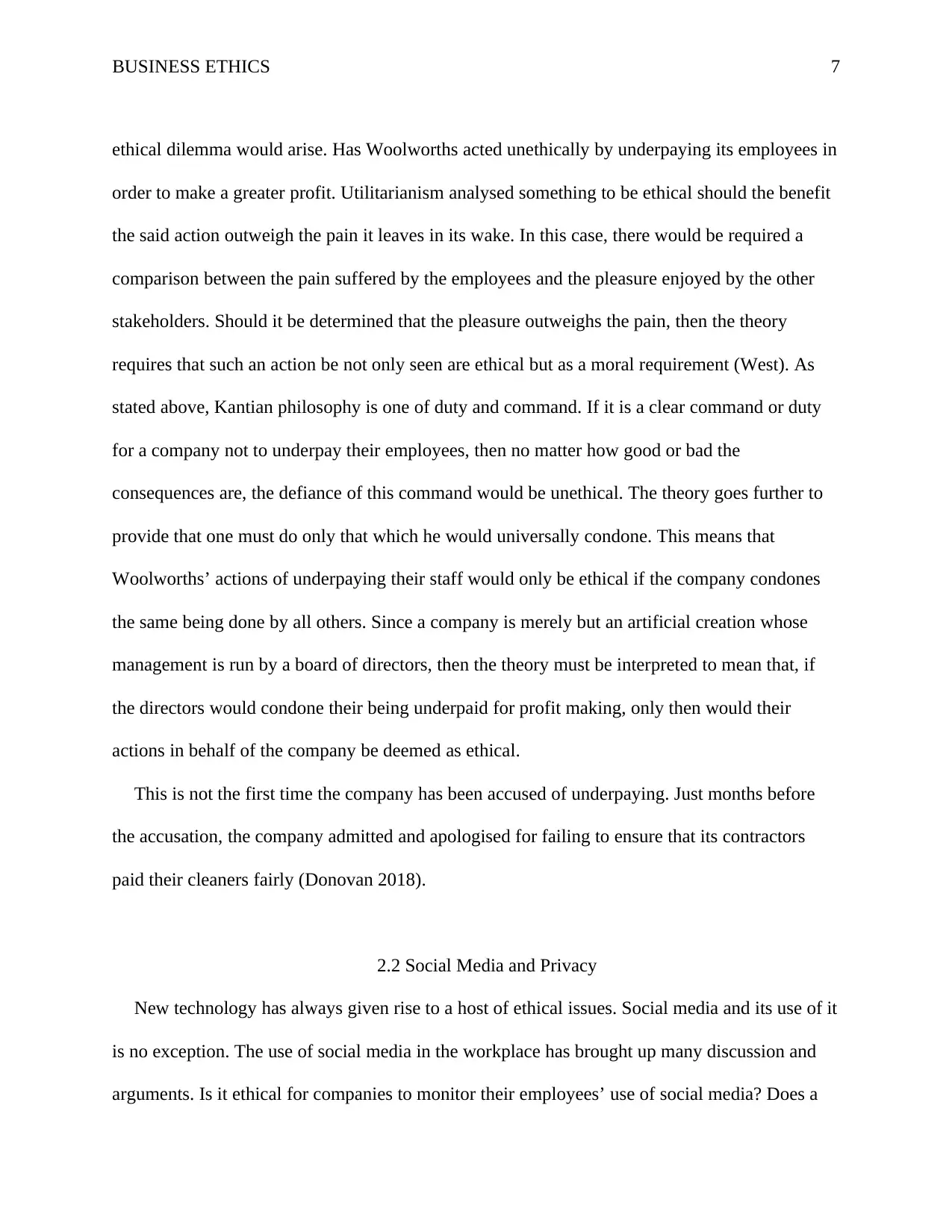
BUSINESS ETHICS 7
ethical dilemma would arise. Has Woolworths acted unethically by underpaying its employees in
order to make a greater profit. Utilitarianism analysed something to be ethical should the benefit
the said action outweigh the pain it leaves in its wake. In this case, there would be required a
comparison between the pain suffered by the employees and the pleasure enjoyed by the other
stakeholders. Should it be determined that the pleasure outweighs the pain, then the theory
requires that such an action be not only seen are ethical but as a moral requirement (West). As
stated above, Kantian philosophy is one of duty and command. If it is a clear command or duty
for a company not to underpay their employees, then no matter how good or bad the
consequences are, the defiance of this command would be unethical. The theory goes further to
provide that one must do only that which he would universally condone. This means that
Woolworths’ actions of underpaying their staff would only be ethical if the company condones
the same being done by all others. Since a company is merely but an artificial creation whose
management is run by a board of directors, then the theory must be interpreted to mean that, if
the directors would condone their being underpaid for profit making, only then would their
actions in behalf of the company be deemed as ethical.
This is not the first time the company has been accused of underpaying. Just months before
the accusation, the company admitted and apologised for failing to ensure that its contractors
paid their cleaners fairly (Donovan 2018).
2.2 Social Media and Privacy
New technology has always given rise to a host of ethical issues. Social media and its use of it
is no exception. The use of social media in the workplace has brought up many discussion and
arguments. Is it ethical for companies to monitor their employees’ use of social media? Does a
ethical dilemma would arise. Has Woolworths acted unethically by underpaying its employees in
order to make a greater profit. Utilitarianism analysed something to be ethical should the benefit
the said action outweigh the pain it leaves in its wake. In this case, there would be required a
comparison between the pain suffered by the employees and the pleasure enjoyed by the other
stakeholders. Should it be determined that the pleasure outweighs the pain, then the theory
requires that such an action be not only seen are ethical but as a moral requirement (West). As
stated above, Kantian philosophy is one of duty and command. If it is a clear command or duty
for a company not to underpay their employees, then no matter how good or bad the
consequences are, the defiance of this command would be unethical. The theory goes further to
provide that one must do only that which he would universally condone. This means that
Woolworths’ actions of underpaying their staff would only be ethical if the company condones
the same being done by all others. Since a company is merely but an artificial creation whose
management is run by a board of directors, then the theory must be interpreted to mean that, if
the directors would condone their being underpaid for profit making, only then would their
actions in behalf of the company be deemed as ethical.
This is not the first time the company has been accused of underpaying. Just months before
the accusation, the company admitted and apologised for failing to ensure that its contractors
paid their cleaners fairly (Donovan 2018).
2.2 Social Media and Privacy
New technology has always given rise to a host of ethical issues. Social media and its use of it
is no exception. The use of social media in the workplace has brought up many discussion and
arguments. Is it ethical for companies to monitor their employees’ use of social media? Does a
Paraphrase This Document
Need a fresh take? Get an instant paraphrase of this document with our AI Paraphraser
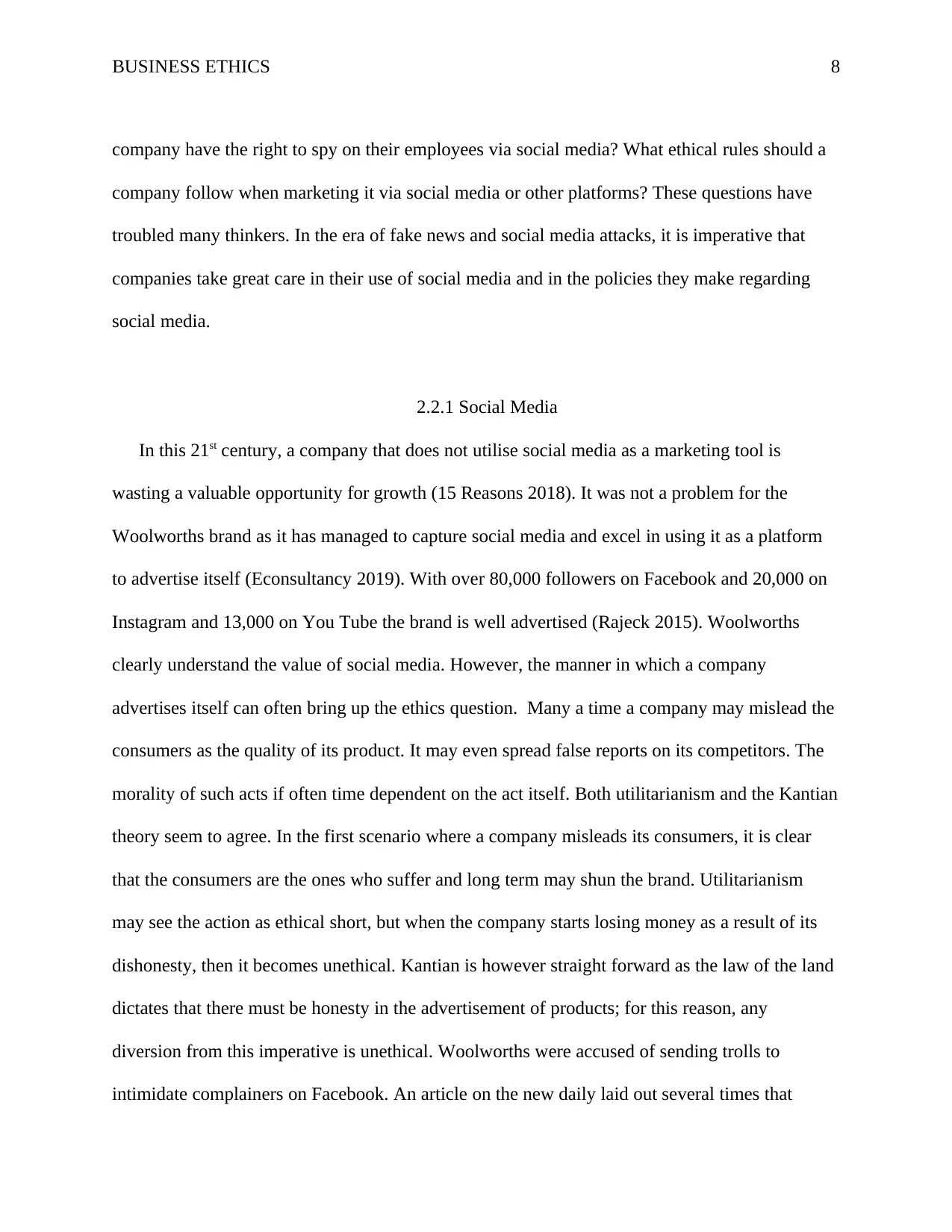
BUSINESS ETHICS 8
company have the right to spy on their employees via social media? What ethical rules should a
company follow when marketing it via social media or other platforms? These questions have
troubled many thinkers. In the era of fake news and social media attacks, it is imperative that
companies take great care in their use of social media and in the policies they make regarding
social media.
2.2.1 Social Media
In this 21st century, a company that does not utilise social media as a marketing tool is
wasting a valuable opportunity for growth (15 Reasons 2018). It was not a problem for the
Woolworths brand as it has managed to capture social media and excel in using it as a platform
to advertise itself (Econsultancy 2019). With over 80,000 followers on Facebook and 20,000 on
Instagram and 13,000 on You Tube the brand is well advertised (Rajeck 2015). Woolworths
clearly understand the value of social media. However, the manner in which a company
advertises itself can often bring up the ethics question. Many a time a company may mislead the
consumers as the quality of its product. It may even spread false reports on its competitors. The
morality of such acts if often time dependent on the act itself. Both utilitarianism and the Kantian
theory seem to agree. In the first scenario where a company misleads its consumers, it is clear
that the consumers are the ones who suffer and long term may shun the brand. Utilitarianism
may see the action as ethical short, but when the company starts losing money as a result of its
dishonesty, then it becomes unethical. Kantian is however straight forward as the law of the land
dictates that there must be honesty in the advertisement of products; for this reason, any
diversion from this imperative is unethical. Woolworths were accused of sending trolls to
intimidate complainers on Facebook. An article on the new daily laid out several times that
company have the right to spy on their employees via social media? What ethical rules should a
company follow when marketing it via social media or other platforms? These questions have
troubled many thinkers. In the era of fake news and social media attacks, it is imperative that
companies take great care in their use of social media and in the policies they make regarding
social media.
2.2.1 Social Media
In this 21st century, a company that does not utilise social media as a marketing tool is
wasting a valuable opportunity for growth (15 Reasons 2018). It was not a problem for the
Woolworths brand as it has managed to capture social media and excel in using it as a platform
to advertise itself (Econsultancy 2019). With over 80,000 followers on Facebook and 20,000 on
Instagram and 13,000 on You Tube the brand is well advertised (Rajeck 2015). Woolworths
clearly understand the value of social media. However, the manner in which a company
advertises itself can often bring up the ethics question. Many a time a company may mislead the
consumers as the quality of its product. It may even spread false reports on its competitors. The
morality of such acts if often time dependent on the act itself. Both utilitarianism and the Kantian
theory seem to agree. In the first scenario where a company misleads its consumers, it is clear
that the consumers are the ones who suffer and long term may shun the brand. Utilitarianism
may see the action as ethical short, but when the company starts losing money as a result of its
dishonesty, then it becomes unethical. Kantian is however straight forward as the law of the land
dictates that there must be honesty in the advertisement of products; for this reason, any
diversion from this imperative is unethical. Woolworths were accused of sending trolls to
intimidate complainers on Facebook. An article on the new daily laid out several times that
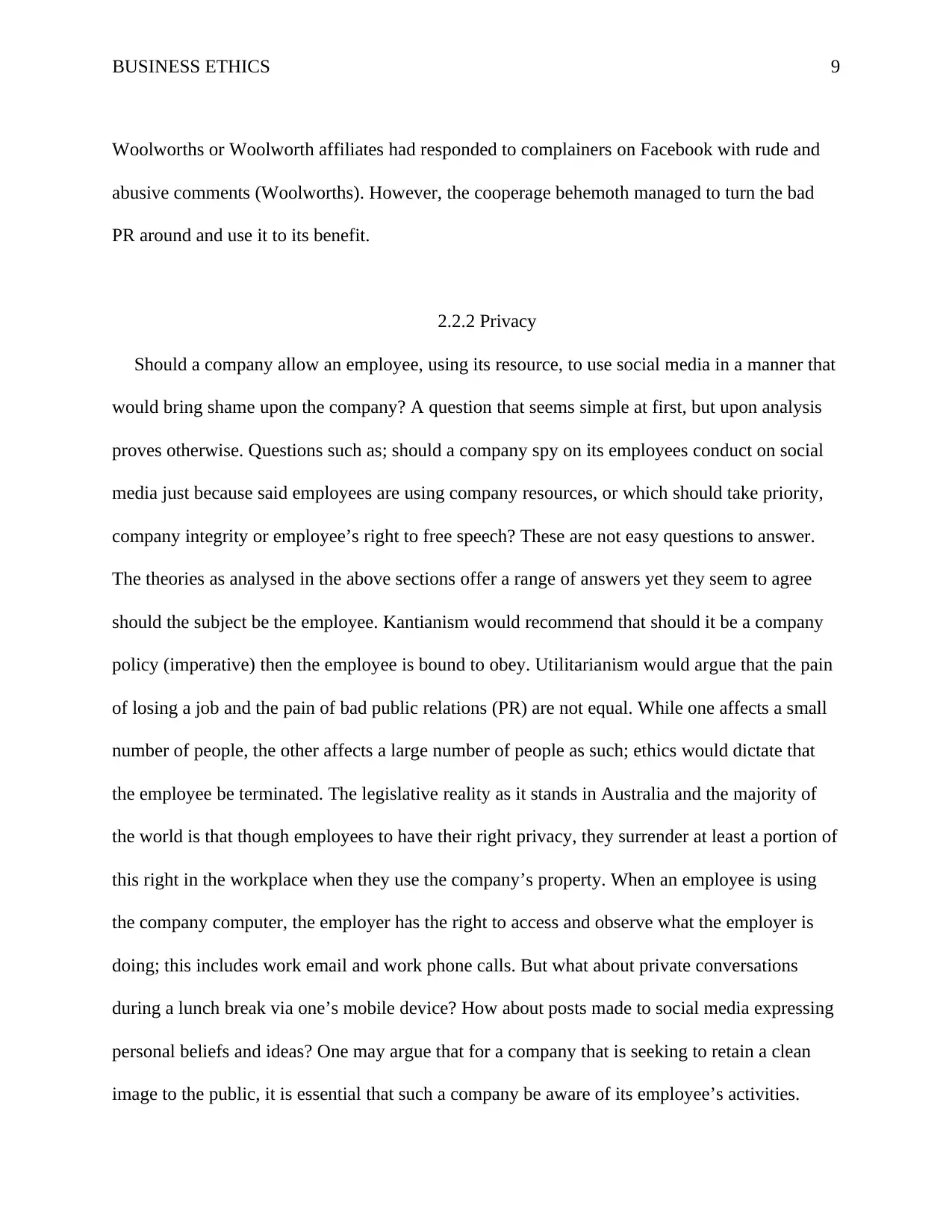
BUSINESS ETHICS 9
Woolworths or Woolworth affiliates had responded to complainers on Facebook with rude and
abusive comments (Woolworths). However, the cooperage behemoth managed to turn the bad
PR around and use it to its benefit.
2.2.2 Privacy
Should a company allow an employee, using its resource, to use social media in a manner that
would bring shame upon the company? A question that seems simple at first, but upon analysis
proves otherwise. Questions such as; should a company spy on its employees conduct on social
media just because said employees are using company resources, or which should take priority,
company integrity or employee’s right to free speech? These are not easy questions to answer.
The theories as analysed in the above sections offer a range of answers yet they seem to agree
should the subject be the employee. Kantianism would recommend that should it be a company
policy (imperative) then the employee is bound to obey. Utilitarianism would argue that the pain
of losing a job and the pain of bad public relations (PR) are not equal. While one affects a small
number of people, the other affects a large number of people as such; ethics would dictate that
the employee be terminated. The legislative reality as it stands in Australia and the majority of
the world is that though employees to have their right privacy, they surrender at least a portion of
this right in the workplace when they use the company’s property. When an employee is using
the company computer, the employer has the right to access and observe what the employer is
doing; this includes work email and work phone calls. But what about private conversations
during a lunch break via one’s mobile device? How about posts made to social media expressing
personal beliefs and ideas? One may argue that for a company that is seeking to retain a clean
image to the public, it is essential that such a company be aware of its employee’s activities.
Woolworths or Woolworth affiliates had responded to complainers on Facebook with rude and
abusive comments (Woolworths). However, the cooperage behemoth managed to turn the bad
PR around and use it to its benefit.
2.2.2 Privacy
Should a company allow an employee, using its resource, to use social media in a manner that
would bring shame upon the company? A question that seems simple at first, but upon analysis
proves otherwise. Questions such as; should a company spy on its employees conduct on social
media just because said employees are using company resources, or which should take priority,
company integrity or employee’s right to free speech? These are not easy questions to answer.
The theories as analysed in the above sections offer a range of answers yet they seem to agree
should the subject be the employee. Kantianism would recommend that should it be a company
policy (imperative) then the employee is bound to obey. Utilitarianism would argue that the pain
of losing a job and the pain of bad public relations (PR) are not equal. While one affects a small
number of people, the other affects a large number of people as such; ethics would dictate that
the employee be terminated. The legislative reality as it stands in Australia and the majority of
the world is that though employees to have their right privacy, they surrender at least a portion of
this right in the workplace when they use the company’s property. When an employee is using
the company computer, the employer has the right to access and observe what the employer is
doing; this includes work email and work phone calls. But what about private conversations
during a lunch break via one’s mobile device? How about posts made to social media expressing
personal beliefs and ideas? One may argue that for a company that is seeking to retain a clean
image to the public, it is essential that such a company be aware of its employee’s activities.
⊘ This is a preview!⊘
Do you want full access?
Subscribe today to unlock all pages.

Trusted by 1+ million students worldwide
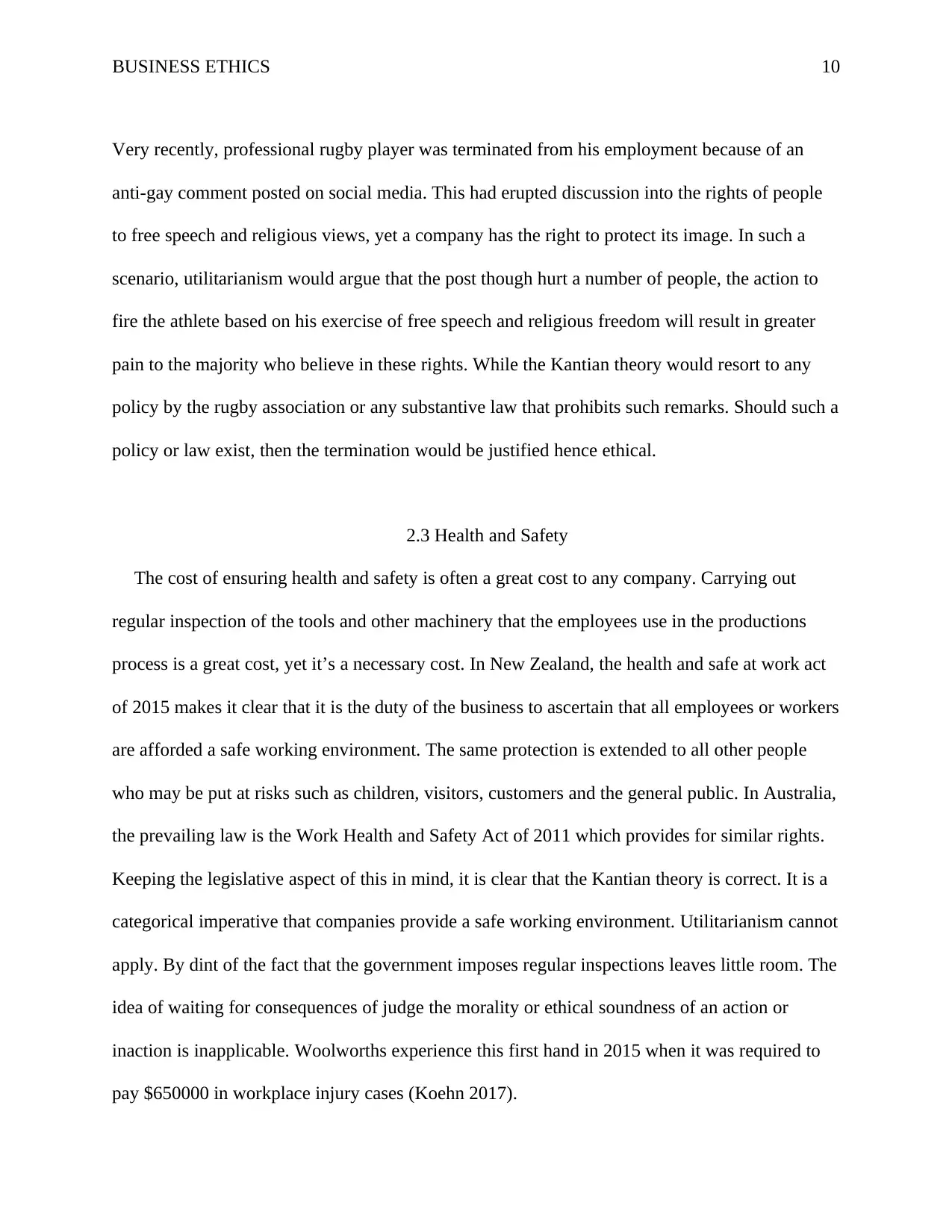
BUSINESS ETHICS 10
Very recently, professional rugby player was terminated from his employment because of an
anti-gay comment posted on social media. This had erupted discussion into the rights of people
to free speech and religious views, yet a company has the right to protect its image. In such a
scenario, utilitarianism would argue that the post though hurt a number of people, the action to
fire the athlete based on his exercise of free speech and religious freedom will result in greater
pain to the majority who believe in these rights. While the Kantian theory would resort to any
policy by the rugby association or any substantive law that prohibits such remarks. Should such a
policy or law exist, then the termination would be justified hence ethical.
2.3 Health and Safety
The cost of ensuring health and safety is often a great cost to any company. Carrying out
regular inspection of the tools and other machinery that the employees use in the productions
process is a great cost, yet it’s a necessary cost. In New Zealand, the health and safe at work act
of 2015 makes it clear that it is the duty of the business to ascertain that all employees or workers
are afforded a safe working environment. The same protection is extended to all other people
who may be put at risks such as children, visitors, customers and the general public. In Australia,
the prevailing law is the Work Health and Safety Act of 2011 which provides for similar rights.
Keeping the legislative aspect of this in mind, it is clear that the Kantian theory is correct. It is a
categorical imperative that companies provide a safe working environment. Utilitarianism cannot
apply. By dint of the fact that the government imposes regular inspections leaves little room. The
idea of waiting for consequences of judge the morality or ethical soundness of an action or
inaction is inapplicable. Woolworths experience this first hand in 2015 when it was required to
pay $650000 in workplace injury cases (Koehn 2017).
Very recently, professional rugby player was terminated from his employment because of an
anti-gay comment posted on social media. This had erupted discussion into the rights of people
to free speech and religious views, yet a company has the right to protect its image. In such a
scenario, utilitarianism would argue that the post though hurt a number of people, the action to
fire the athlete based on his exercise of free speech and religious freedom will result in greater
pain to the majority who believe in these rights. While the Kantian theory would resort to any
policy by the rugby association or any substantive law that prohibits such remarks. Should such a
policy or law exist, then the termination would be justified hence ethical.
2.3 Health and Safety
The cost of ensuring health and safety is often a great cost to any company. Carrying out
regular inspection of the tools and other machinery that the employees use in the productions
process is a great cost, yet it’s a necessary cost. In New Zealand, the health and safe at work act
of 2015 makes it clear that it is the duty of the business to ascertain that all employees or workers
are afforded a safe working environment. The same protection is extended to all other people
who may be put at risks such as children, visitors, customers and the general public. In Australia,
the prevailing law is the Work Health and Safety Act of 2011 which provides for similar rights.
Keeping the legislative aspect of this in mind, it is clear that the Kantian theory is correct. It is a
categorical imperative that companies provide a safe working environment. Utilitarianism cannot
apply. By dint of the fact that the government imposes regular inspections leaves little room. The
idea of waiting for consequences of judge the morality or ethical soundness of an action or
inaction is inapplicable. Woolworths experience this first hand in 2015 when it was required to
pay $650000 in workplace injury cases (Koehn 2017).
Paraphrase This Document
Need a fresh take? Get an instant paraphrase of this document with our AI Paraphraser
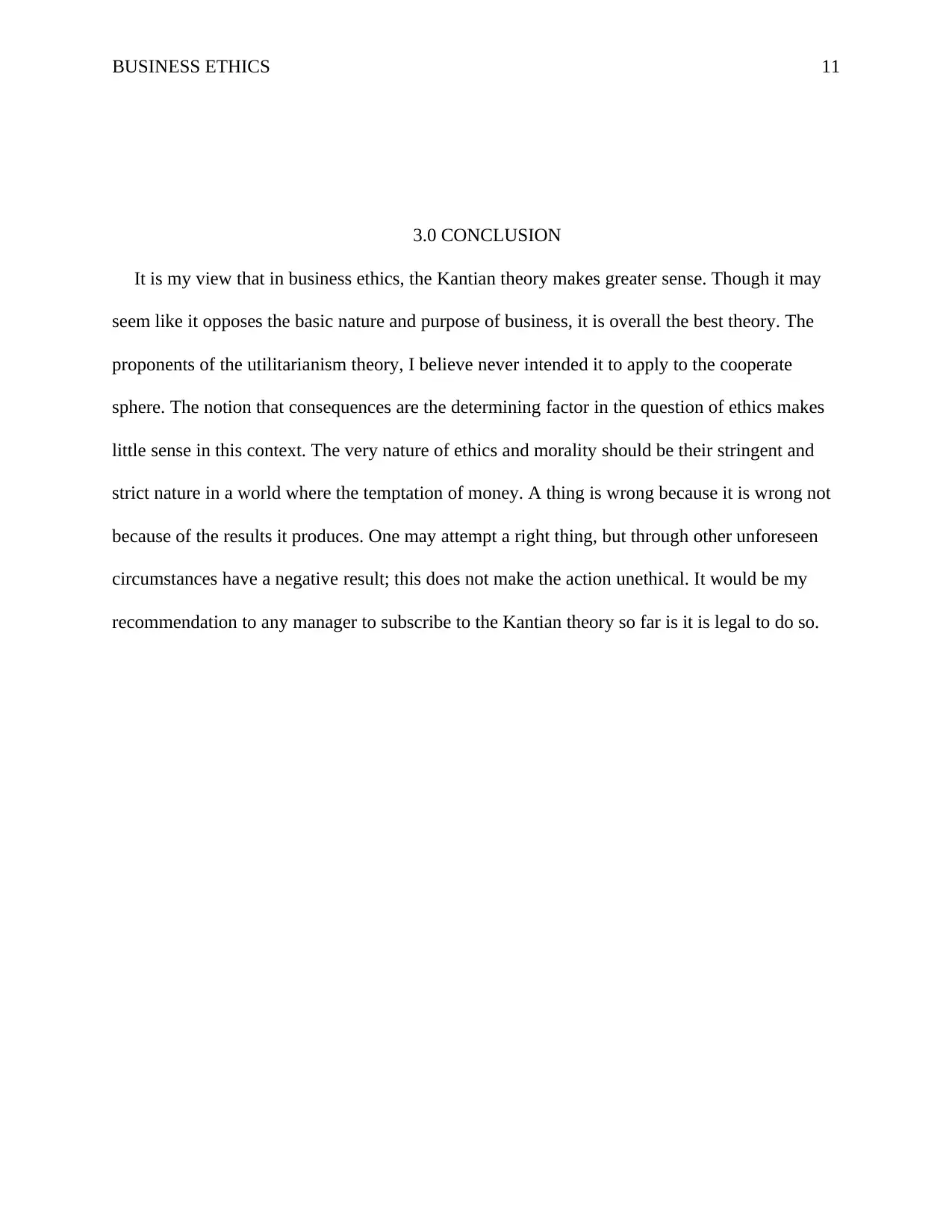
BUSINESS ETHICS 11
3.0 CONCLUSION
It is my view that in business ethics, the Kantian theory makes greater sense. Though it may
seem like it opposes the basic nature and purpose of business, it is overall the best theory. The
proponents of the utilitarianism theory, I believe never intended it to apply to the cooperate
sphere. The notion that consequences are the determining factor in the question of ethics makes
little sense in this context. The very nature of ethics and morality should be their stringent and
strict nature in a world where the temptation of money. A thing is wrong because it is wrong not
because of the results it produces. One may attempt a right thing, but through other unforeseen
circumstances have a negative result; this does not make the action unethical. It would be my
recommendation to any manager to subscribe to the Kantian theory so far is it is legal to do so.
3.0 CONCLUSION
It is my view that in business ethics, the Kantian theory makes greater sense. Though it may
seem like it opposes the basic nature and purpose of business, it is overall the best theory. The
proponents of the utilitarianism theory, I believe never intended it to apply to the cooperate
sphere. The notion that consequences are the determining factor in the question of ethics makes
little sense in this context. The very nature of ethics and morality should be their stringent and
strict nature in a world where the temptation of money. A thing is wrong because it is wrong not
because of the results it produces. One may attempt a right thing, but through other unforeseen
circumstances have a negative result; this does not make the action unethical. It would be my
recommendation to any manager to subscribe to the Kantian theory so far is it is legal to do so.
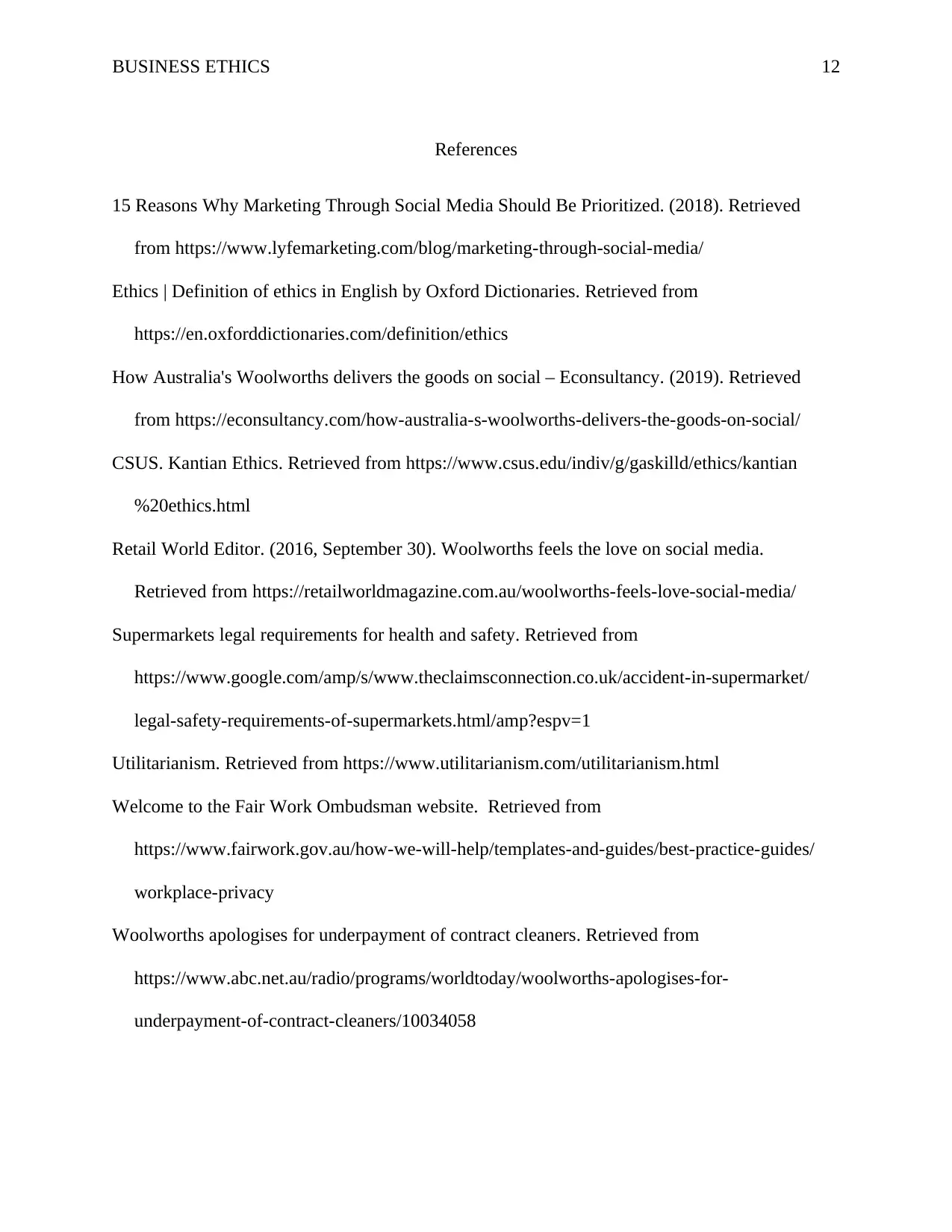
BUSINESS ETHICS 12
References
15 Reasons Why Marketing Through Social Media Should Be Prioritized. (2018). Retrieved
from https://www.lyfemarketing.com/blog/marketing-through-social-media/
Ethics | Definition of ethics in English by Oxford Dictionaries. Retrieved from
https://en.oxforddictionaries.com/definition/ethics
How Australia's Woolworths delivers the goods on social – Econsultancy. (2019). Retrieved
from https://econsultancy.com/how-australia-s-woolworths-delivers-the-goods-on-social/
CSUS. Kantian Ethics. Retrieved from https://www.csus.edu/indiv/g/gaskilld/ethics/kantian
%20ethics.html
Retail World Editor. (2016, September 30). Woolworths feels the love on social media.
Retrieved from https://retailworldmagazine.com.au/woolworths-feels-love-social-media/
Supermarkets legal requirements for health and safety. Retrieved from
https://www.google.com/amp/s/www.theclaimsconnection.co.uk/accident-in-supermarket/
legal-safety-requirements-of-supermarkets.html/amp?espv=1
Utilitarianism. Retrieved from https://www.utilitarianism.com/utilitarianism.html
Welcome to the Fair Work Ombudsman website. Retrieved from
https://www.fairwork.gov.au/how-we-will-help/templates-and-guides/best-practice-guides/
workplace-privacy
Woolworths apologises for underpayment of contract cleaners. Retrieved from
https://www.abc.net.au/radio/programs/worldtoday/woolworths-apologises-for-
underpayment-of-contract-cleaners/10034058
References
15 Reasons Why Marketing Through Social Media Should Be Prioritized. (2018). Retrieved
from https://www.lyfemarketing.com/blog/marketing-through-social-media/
Ethics | Definition of ethics in English by Oxford Dictionaries. Retrieved from
https://en.oxforddictionaries.com/definition/ethics
How Australia's Woolworths delivers the goods on social – Econsultancy. (2019). Retrieved
from https://econsultancy.com/how-australia-s-woolworths-delivers-the-goods-on-social/
CSUS. Kantian Ethics. Retrieved from https://www.csus.edu/indiv/g/gaskilld/ethics/kantian
%20ethics.html
Retail World Editor. (2016, September 30). Woolworths feels the love on social media.
Retrieved from https://retailworldmagazine.com.au/woolworths-feels-love-social-media/
Supermarkets legal requirements for health and safety. Retrieved from
https://www.google.com/amp/s/www.theclaimsconnection.co.uk/accident-in-supermarket/
legal-safety-requirements-of-supermarkets.html/amp?espv=1
Utilitarianism. Retrieved from https://www.utilitarianism.com/utilitarianism.html
Welcome to the Fair Work Ombudsman website. Retrieved from
https://www.fairwork.gov.au/how-we-will-help/templates-and-guides/best-practice-guides/
workplace-privacy
Woolworths apologises for underpayment of contract cleaners. Retrieved from
https://www.abc.net.au/radio/programs/worldtoday/woolworths-apologises-for-
underpayment-of-contract-cleaners/10034058
⊘ This is a preview!⊘
Do you want full access?
Subscribe today to unlock all pages.

Trusted by 1+ million students worldwide
1 out of 13
Related Documents
Your All-in-One AI-Powered Toolkit for Academic Success.
+13062052269
info@desklib.com
Available 24*7 on WhatsApp / Email
![[object Object]](/_next/static/media/star-bottom.7253800d.svg)
Unlock your academic potential
Copyright © 2020–2026 A2Z Services. All Rights Reserved. Developed and managed by ZUCOL.




